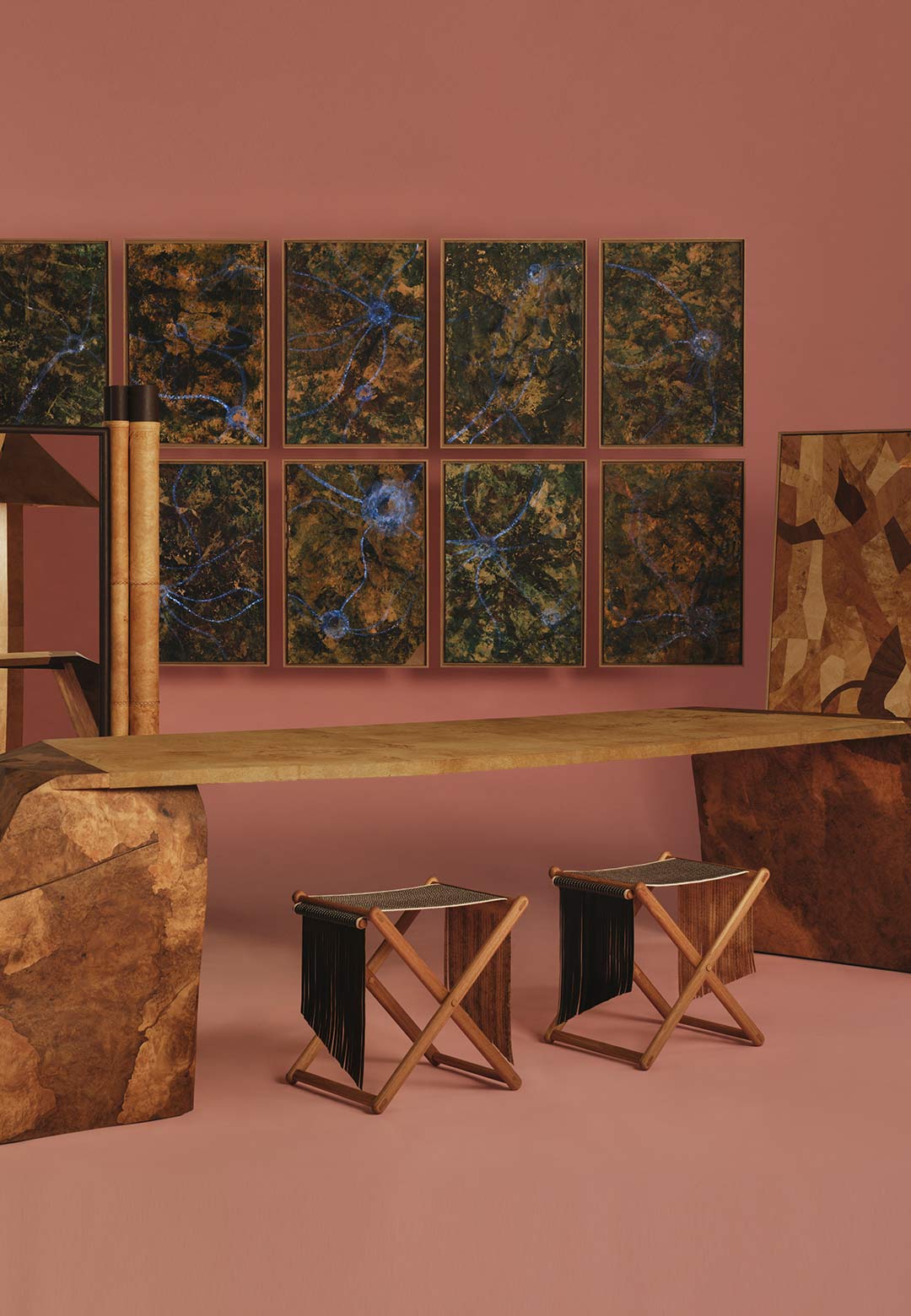Founded by Philip Ross and Sophia Wang, California-based biotechnology company MycoWorks works at the intersection of art, design and biotechnology. What began as a personal project by Ross in the 1990s, with the cultivation of mycelium, developed, with varied experiences and encounters with the fungi, into a fascination with mycology. With a special focus on reishi mushrooms, Ross soon began experimenting with the fungi to make sculptures and other functional objects and entities. Eventually, with the establishment of MycoWorks in 2013 (with Wang, his long-time artistic collaborator), this exploration and experimentation was narrativised to be presented before the world. Since then, MycoWorks has served as a workshop laboratory for various artists intent on discovering new ways to work with fungi. The US-based practice has developed two materials so far—Fine Mycelium™ and Reishi™, which they use to sculpt novel objects.
For a presentation at Design Miami.Paris, from October 15 - 20, 2024, MycoWorks, in collaboration with French design agency Paragone, invited seven women artists, designers and architects to experiment with Reishi™ and build indoor objects and furniture designs imbued in their unique taste, style and sensibility. Woven from mycelium, Reishi™ is a cross between leather and fabric. Malleable and versatile, it bears the flexibility of noble fabrics while embodying the potential to be transformed in a multitude of ways—it can be dyed, embossed, varnished and finished.
The culmination of this project is the Mycelium Muse collection. Conceived by visual artists Sarah Valente and Pauline Guerrier, artisans Anna Le Corno, architects Sophie Dries, Marion Mailaender and Fanny Perrier as well as interior designers Joséphine Fossey, the objects comprising the collection include a table, stools, a lamp, mirror, screen and wall art. This collection, which brings Reishi™ to life, is on display in Paris, France, under the moniker Mycelium Muse: Discover Reishi™. Musing on mycelium, the creatives have designed aesthetic pieces that also fulfil the demand for environmental durability and sustainable design.
"These seven women embody the very essence of what it means to be a modern muse - creative, powerful and unafraid to push the boundaries of design. With Mycelium Muse, we are witnessing a harmonious blend of nature and art, paving the way for a sustainable and aesthetically enriched future," said Guillaume de Saint Lager, founder of the design agency Paragone. “Mycelium Muse is an epic achievement for Reishi™ in design. And it's a moment when our most unique sheets shine. For these artists, the variations and irregularities of some of our sheets have become expressive entry points for exploring the mysteries of mycelium through design and art,” adds Xavier Gallego, Creative Director of MycoWorks.
French architect Sophie Dries, inspired by the natural mottles, streaks and the irregular edges of Reishi™, created the totemic foot mirror Khara in a brutalist mien, for the design event. Supported by blocky cylindrical Corten tubes, the mirror design is backed by the Reishi™ fabric stretching out plainly. "I loved working with this unique material, surrounded by exceptional young craftsmen in Paris—blacksmiths and leatherworkers," relays Dries.
French artist Marion Mailaender, known for creating Dadaist objects, conceived the Aspen stools for the design exhibition. Mailaender shares, "I really enjoyed experimenting with an innovative material in a classic furniture format." Designed as a portable seat, the humorous Aspen stool designs exemplify the melding of traditional techniques of sewing and sheathing with the contemporary practice of laser cutting.
The Undergrowth desk by architect Anna Le Corno is characterised by organically shaped foot supports that are evocative of rough-hewn logs. An experimental architect who plays with novel techniques and materials in her work, Corno imbues each of her creations with a fierce and wild aesthetic. This table design too, a combination of two natural materials—a Reishi™ sheathing and myrtle burr veneer—is undersigned by an untamed and untempered aesthetic. "Undergrowth is an encounter between Reishi™ and myrtle burr: two materials whose beauty lies in the imperfections that arise from their natural growth," shares Corno, about her showcase at the design fair.
Perhaps the most minimalist pieces on display at the design festival, is artistic director Josephine Fossey's Lampadaire Silencieux lamp design, which is characterised by clean, sleek lines and an uncluttered look. "Lampadaire Silencieux embodies material innovation and timeless elegance, fusing tradition and modernity," the artist shares. Its lampshade evocatively exemplifies the opalescence of Reishi™ and its ability to diffuse a soft, warm light.
"While exploring the idea of the transition from the animal to the vegetal, I was reminded of the myth of Daphnée, who metamorphosed into a tree to escape Apollo's grasp," shares Pauline Guerrier, explaining the inspiration behind Daphne, The Metamorphosis, a bas-relief screen. While exploring Daphnée’s story, Guerrier further latched on to the myth of the Hamadryades or wood nymphs, who, in Greek mythology, are bonded to a tree with which they share their destiny in birth, old age and death. Hence, Guerrier's bas relief is an abstract composition that serves as a tribute to the Hamadryades and an ode to Daphne.
Visual artist and photographer Sarah Valente's Magic Ancestors is a monumental fresco that comprises 10 sheets of Reishi™ that have been painted, rubbed, soaked and folded. "It's inspiring to work with mycelium when you know that life on earth would be impossible without them. It's a privilege to immerse yourself in this material and in the spirit of this kingdom," remarks Valente. Emulating this thought, Magic Ancestors bears references to floral and faunal motifs from the forest. Further, the product design is characterised by a second layer of a luminescent network embossed on the mural. One can observe it in darkness.
Lastly, French designer and interior architect Fanny Perrier's neo-classical folding screen is inspired by ornamental screens from the 1930s. The six-panel Reishi™-covered screen on a solid, recessed base with silent glides, helps renew a typology of object that is typically construed in parchment or leather.
'Mycelium Muse: Discover Reishi™' is on view from October 15 - 20, 2024, at Design Miami.Paris, at 51 rue de l'université, 75005 Paris.
- California
- craftsmanship
- design event
- Design Exhibition
- design fair
- design festival
- design miami
- france
- french architect
- French artist
- French Design
- French designer
- furniture design
- furniture designer
- Innovative Design
- lamp design
- lighting design
- lighting designer
- Minimalist
- paris
- product design
- Product Designer
- Stool design
- sustainable design
- Table design
- united states
- Visual artist
- Women Artist






 Sign in with email
Sign in with email










What do you think?